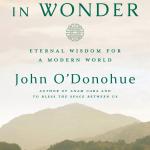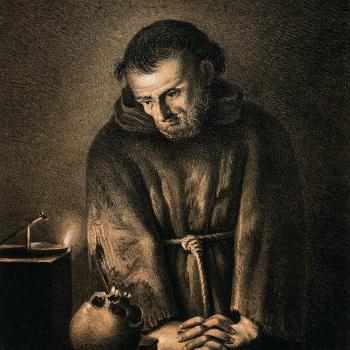I lost a follower on Facebook today. I’m sure it happens all the time, but this time was unusual, in that the person announced that she was leaving.
What triggered this was a quote I posted from the Benedictine monk, Fr. Bede Griffiths:
I got this reply from a (soon to be former) follower:
Catholic doctrine is only a myth??
I had met this person, years ago, out at the monastery; I knew her faith was important to her and so my first assumption was that she simply misunderstood what Bede Griffiths meant by ‘myth’ (which he put in quotation marks, precisely to show that he was not using it in its common meaning). So I replied:
Are you defining myth as “something which is not true”? That’s not how Bede Griffiths is using the word (he was a Catholic — a Benedictine monk).
Apparently she did not find that reassuring.
I taught school for years… A myth is just that. Made up… Not responding to this further. Also no longer following this page.
I posted once more, apologizing for any offense she felt and encouraging her to read Fr. Griffiths. She curtly replied “No thanks.”
This saddens me, in a number of ways.
Social Media and the Limitations of Soundbite Conversations
It’s a reminder of how challenging social media discourse it. Can we really have a meaningful conversation via soundbites? Probably not. And yet isn’t that what we are in effect trying to do when we communicate at 280 characters or less?
Obviously, on Facebook there is room for longer posts, but I think the reality is, even if I had posted a long and involved explanation of why Griffiths was speaking the way he did, this exchange may have ended the same way.
I’m also sad that the person who took umbrage of what I posted (what Bede Griffiths said), immediately closed down the conversation before seeing it through.
We all do that, of course. We cut our losses and run. When we think a conversation is going nowhere, why waste further time.
But from where I sit, this is sad because the conversation got shut down over a semantic difference. And one, I might add, that involves moving from a childhood understanding of myth to an adult understanding.
Childhood and Adult Understandings of Myth
What’s ironic is that I originally shared the Bede Griffiths quote because I thought it was such a concise, helpful exposition of an adult understanding of myth — which is to say, a mystical, as opposed to literary, sense.
In school, we get the literary understanding of myth: an outdated religious idea now regarded as superstition or primitive belief, having only literary value. If that had been what Griffiths meant, then I could understand why my reader got offended. As a schoolteacher, that’s the understanding of myth she was familiar with.
But that’s not what he meant.
The mystical understanding of myth is perhaps best explained by C. S. Lewis: in his book Miracles, he suggests that a myth is, “at its best, a real unfocused gleam of divine truth on human imagination.”
Lewis, incidentally, taught Bede Griffiths at Oxford. A staunch conservative, no one would ever accuse him of watering down Christian doctrine.
We put a lot of emphasis in Christianity in “becoming like a child” which was Jesus’s way of saying we need to revert to beginner’s mind, we need to hold on to, and cherish, a since of wonder and openness to the sheer joyful mystery of life.
But in I Corinthians 13, St. Paul reminds us of the other side of this coin:
When I was a child, I used to talk as a child, think as a child, reason as a child; when I became an adult, I put aside childish things.
Dismissing the concept of myth as just “untrue stories” is to limit the concept of myth. C. S. Lewis used to argue that Christianity is the only “true” myth. I don’t know if it’s the only true myth, but I do believe Christianity is, in fact, a true myth.
It is a story, a narrative, which at its best represents a real unfocused gleam of divine truth on the human imagination. Thank you, C. S. Lewis.
And it is a symbolic expression of truths that cannot be properly expressed — that cannot be put into words. Thank you, Bede Griffiths.
Contemplating Mythic Truth
 Contemplation — and mysticism — concerns how spiritual truth ushers us beyond the point where language begins to break down. Beyond the point where Thomas Aquinas said everything he had written was like straw. Beyond the point where great mystics like Ps.-Dionysius, or Meister Eckhart, or John of the Cross, or the author of The Cloud of Unknowing, maintain that God can only by known by knowing what is not God.
Contemplation — and mysticism — concerns how spiritual truth ushers us beyond the point where language begins to break down. Beyond the point where Thomas Aquinas said everything he had written was like straw. Beyond the point where great mystics like Ps.-Dionysius, or Meister Eckhart, or John of the Cross, or the author of The Cloud of Unknowing, maintain that God can only by known by knowing what is not God.
As another great mystic, Simone Weil, put it, “To believe in God is not a decision we can make. All we can do is to decide not to give our love to false Gods.”
If we approach life — and faith — in a black-and-white way, then we have to nail concepts like “myth” down — either they’re true or they’re not true. This is the mind of the scientist who rejects God because Jesus was a healer but no one has ever been healed of losing a limb. It’s a binary, dualistic way of seeing the world. Fundamentalism, it should be noted, is a reaction against the scientific mind. But it is a reaction in the wrong direction. It retreats into childhood certainties, rather than moving with trust into the mystery that only adults can begin to encounter.
When we let go of the need to see things in black-and-white, we can embrace the fullness of color — a world that may seem less constrained by certainties, but more resonant with sacred possibility. A world where love matters more than law (not that law doesn’t have its place — law is necessary for healthy community — but love matters more). A world where mystery matters more than dogma (and “dogma” is just another variation on “law”). A world where relationship matters more than being right.
Yes, Christianity is a myth, a true myth. May we all enter that myth to explore what cannot be expressed in words, and to bask in that luminous gleam of divine truth, as it sets our imagination on fire.
Enjoy reading this blog?
Click here to become a patron.














